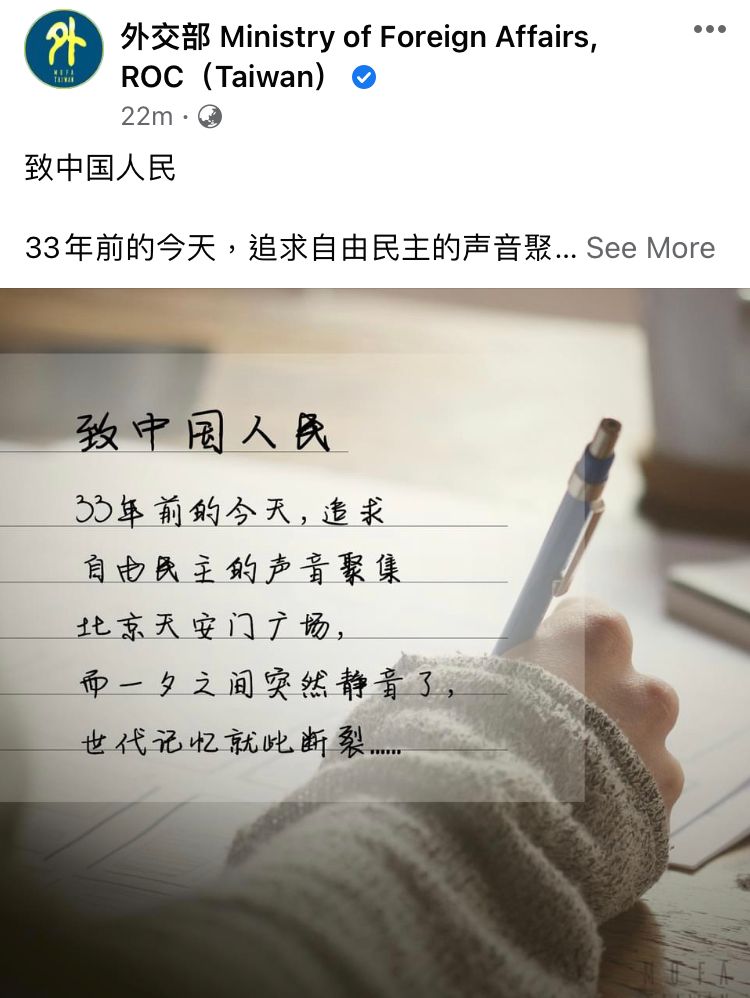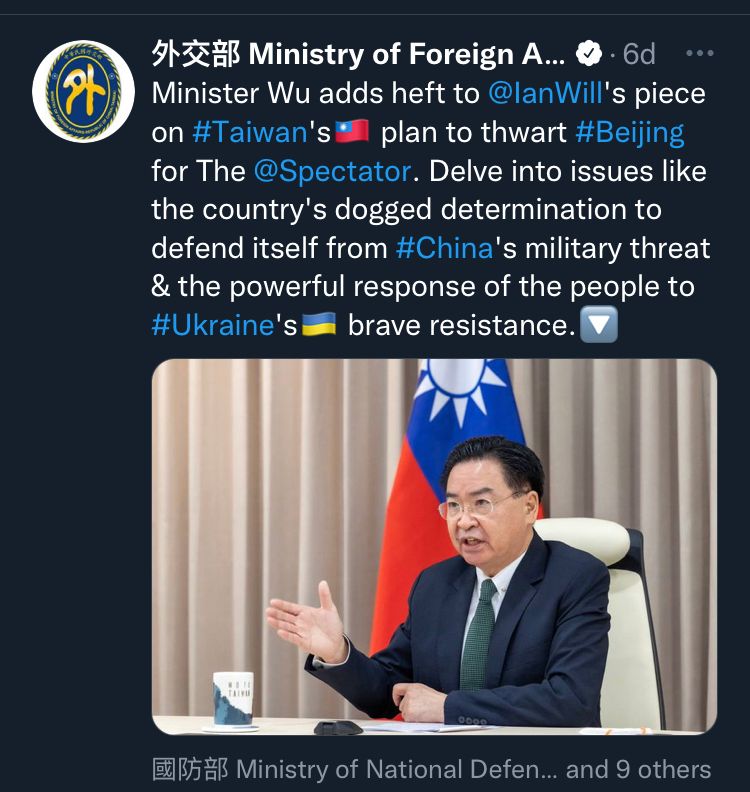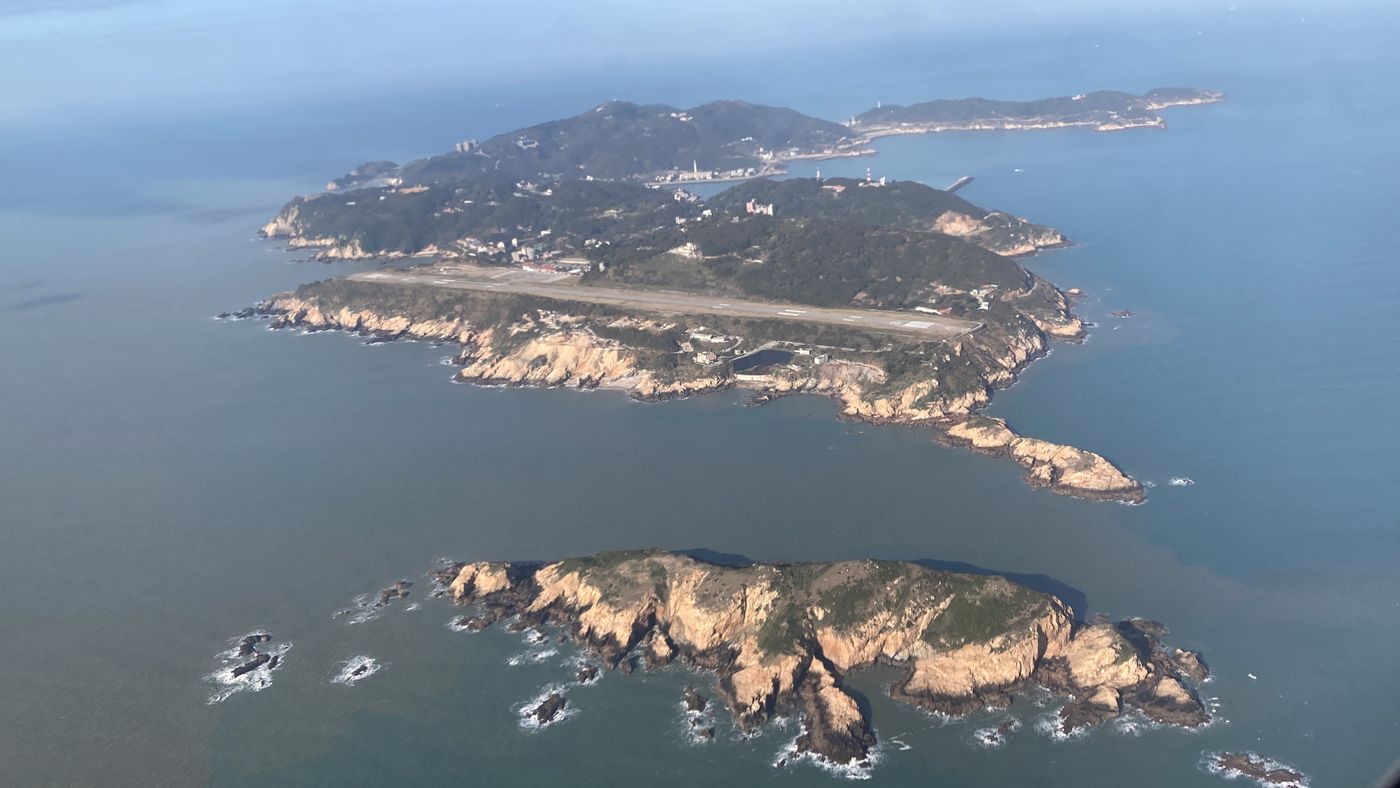June 4th Statement of the Ministry of Foreign Affairs of the Republic of China, "To the Chinese People" in Simplified Chinese

The Facebook fan page of the Ministry of Foreign Affairs posted a post this morning in response to the June 4 incident. The content was in simplified Chinese characters, and the beginning was "To the Chinese people." It was obviously aimed at Chinese netizens who had overcame the wall (or lived overseas). Chinese).
Although relatively obscure, this post actually has a lot of room for interpretation.
First of all, this post issued by the Ministry of Foreign Affairs seems to have a sense of treating "China" as a "foreign country", walking on the tightrope of constitutional government - because legally speaking, "mainland affairs" should not be "foreign affairs" , This kind of post or statement is usually sent by the MAC (Note: The MAC already posted June 4 on Facebook on June 3, but in traditional Chinese).

Of course, before this, the Ministry of Foreign Affairs had already made many posts or statements about China, but those posts were basically in the context of the "CCP threat", shouting to the international community and walking the constitutional tightrope. so thick.
In addition, the nature and level of Facebook posts are not the same as official statements, but in practice, some things that are relatively sensitive or need to be flexible (strategically vague) are not suitable for official statements - this At that time, social media was a field to observe the wind direction and clues, and it was not only the Taiwan government that had this phenomenon.
For example, the U.S. designation of the scope of Taiwan, from the Sino-U.S. Mutual Defense Treaty to the Taiwan Relations Act, has always included only Taiwan and Penghu, but not Kinmen and Matsu. However, between 2020 and 2021, AIT has official personnel going to Jinma and Ma, and even included Jinmen in the scope of Taiwan in a Facebook post:
"Kinmen is not only a beautiful and fascinating part of Taiwan, it is also the backdrop of many years of fascinating US-Taiwan cooperation. "
You can of course say that this may just be an unintentional and not rigorous copywriting by a social media editor, but if you look at the dynamics of the US government at the same time, you will probably feel that things are not so simple:
Just before AIT officials visited Kinmen, the U.S. House of Representatives introduced the Taiwan Invasion Prevention Act on July 29; One of them is “the taking of territory under the effective jurisdiction of Taiwan by the military forces of the People’s Republic of China”.
Although the bill has not yet been passed, it still releases the following message: Kinmen and Matsu, two "areas under the substantial jurisdiction of the Taiwan government," should also be within the scope of the United States' commitment to protection.
About AIT officials going to Kinmen in 2020 and the change in the attitude of the United States towards Jinma at that time, Duan Media has made a report, you can refer to: We followed the footsteps of the US personnel in Taiwan to Kinmen: If the war between the two sides is part of the "Taiwan Relations Act" "scope?

But having said that, has the Ministry of Foreign Affairs expressed its position on the June 4 incident recently?
I checked on Facebook and found that the last similar case should have been in 2019 — that is, on the occasion of the 30th anniversary of June 4th, the Ministry of Foreign Affairs once posted a commemoration on Twitter, but at that time, it used traditional Chinese characters and signed a signature. JW (aka a tweet written by Foreign Minister Wu Zhaoxie himself).
So another interesting question is: Has the Ministry of Foreign Affairs ever issued posts/statements in simplified Chinese before?
The information I have seen on the Internet shows that it is indeed very rare for the Ministry of Foreign Affairs to use simplified characters - the first time in history that it was used in 2018 to clarify the dispute over "leasing Taiping Island to foreign countries", and mentioned that "if you read Difficulty with regular characters, please refer to the simplified version below".
What's more interesting is that although we generally think that Ma Ying-jeou is "pro-China", Ma Ying-jeou's attitude towards simplified Chinese characters is actually quite conservative. Even the simplified version on the Taiwanese government website is said to have been taken down when he was in power.
In contrast, Tsai Ing-wen's attitude towards simplified characters seems to be relatively calm, and he has used simplified characters to make statements many times (such as condolences to the Chinese who died in the Hualien earthquake, or shouting to Chinese netizens in response to June 4th).
This phenomenon probably also reflects that the DPP government no longer views cross-strait affairs in the framework of "the Han and the thieves do not stand apart from each other", so it is more able to view simplified characters with an ordinary mind.
Like my work? Don't forget to support and clap, let me know that you are with me on the road of creation. Keep this enthusiasm together!
